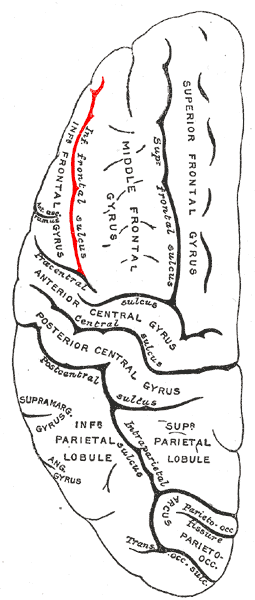Inferior frontal sulcus
| General Information | |
|---|---|
| Latin | sulcus frontalis inferior |
| Greek | |
| TA98 | |
| TA2 | |
| FMA | |
| Details | |
| System | |
| Artery | Middle cerebral artery |
| Vein | Superior sagittal sinus |
| Nerve | |
| Lymphatic drainage | |
| Precursor | |
| Function | |
| Identifiers | |
| Clinical significance | |
| Notes | |
Lua error in package.lua at line 80: module 'strict' not found.
The inferior frontal sulcus is a prominent anatomical feature of the frontal lobe of the human brain. It is a groove or furrow that separates the inferior frontal gyrus from the middle frontal gyrus. This sulcus plays a significant role in the organization of the frontal lobe and is involved in various cognitive functions.
Anatomy[edit | edit source]
The inferior frontal sulcus is located on the lateral surface of the frontal lobe. It runs horizontally, parallel to the superior frontal sulcus, and is situated below it. The sulcus begins near the precentral sulcus and extends anteriorly towards the frontal pole, although its exact length and depth can vary among individuals.
Function[edit | edit source]
While the inferior frontal sulcus itself is not directly responsible for specific cognitive functions, it serves as an important landmark for identifying adjacent cortical areas that are involved in various brain activities. The regions surrounding the inferior frontal sulcus, particularly the inferior frontal gyrus, are associated with language processing, executive functions, and motor control.
The Broca's area, which is crucial for speech production, is located in the posterior part of the inferior frontal gyrus, near the inferior frontal sulcus. This area is typically found in the left hemisphere of the brain and is involved in the formulation of language and speech.
Clinical Significance[edit | edit source]
The inferior frontal sulcus is often used as a reference point in neurosurgical procedures and neuroimaging studies. Its identification is crucial for accurately mapping the frontal lobe and avoiding damage to critical areas during surgery.
Lesions or abnormalities in the regions surrounding the inferior frontal sulcus can lead to deficits in language, executive function, and motor skills. For instance, damage to the Broca's area can result in Broca's aphasia, characterized by impaired speech production and difficulty in forming grammatically correct sentences.
Development[edit | edit source]
The development of the inferior frontal sulcus occurs during fetal brain development and continues to mature postnatally. The sulcus becomes more pronounced as the brain develops, and its formation is influenced by genetic and environmental factors.
Research[edit | edit source]
Recent studies using functional magnetic resonance imaging (fMRI) have explored the role of the inferior frontal sulcus in cognitive tasks. These studies suggest that the sulcus and its surrounding regions are activated during tasks that require language processing, working memory, and decision-making.
Also see[edit | edit source]
| Neuroanatomy | ||||||||||
|---|---|---|---|---|---|---|---|---|---|---|
This neuroanatomy-related article is a stub.
|
Search WikiMD
Ad.Tired of being Overweight? Try W8MD's physician weight loss program.
Semaglutide (Ozempic / Wegovy and Tirzepatide (Mounjaro / Zepbound) available.
Advertise on WikiMD
|
WikiMD's Wellness Encyclopedia |
| Let Food Be Thy Medicine Medicine Thy Food - Hippocrates |
Translate this page: - East Asian
中文,
日本,
한국어,
South Asian
हिन्दी,
தமிழ்,
తెలుగు,
Urdu,
ಕನ್ನಡ,
Southeast Asian
Indonesian,
Vietnamese,
Thai,
မြန်မာဘာသာ,
বাংলা
European
español,
Deutsch,
français,
Greek,
português do Brasil,
polski,
română,
русский,
Nederlands,
norsk,
svenska,
suomi,
Italian
Middle Eastern & African
عربى,
Turkish,
Persian,
Hebrew,
Afrikaans,
isiZulu,
Kiswahili,
Other
Bulgarian,
Hungarian,
Czech,
Swedish,
മലയാളം,
मराठी,
ਪੰਜਾਬੀ,
ગુજરાતી,
Portuguese,
Ukrainian
Medical Disclaimer: WikiMD is not a substitute for professional medical advice. The information on WikiMD is provided as an information resource only, may be incorrect, outdated or misleading, and is not to be used or relied on for any diagnostic or treatment purposes. Please consult your health care provider before making any healthcare decisions or for guidance about a specific medical condition. WikiMD expressly disclaims responsibility, and shall have no liability, for any damages, loss, injury, or liability whatsoever suffered as a result of your reliance on the information contained in this site. By visiting this site you agree to the foregoing terms and conditions, which may from time to time be changed or supplemented by WikiMD. If you do not agree to the foregoing terms and conditions, you should not enter or use this site. See full disclaimer.
Credits:Most images are courtesy of Wikimedia commons, and templates, categories Wikipedia, licensed under CC BY SA or similar.
Contributors: Prab R. Tumpati, MD




